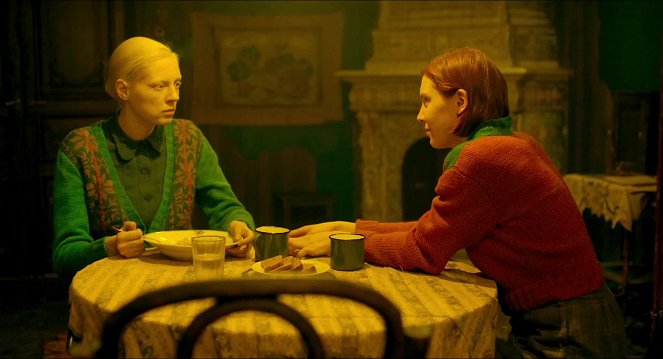Realização:
Kantemir BalagovArgumento:
Kantemir BalagovCâmara:
Kseniya SeredaMúsica:
Evgeniy GalperinElenco:
Viktoriya Miroshnichenko, Vasilisa Perelygina, Timofey Glazkov, Igor Shirokov, Ксения Кутепова, Константин Балакирев, Ольга Драгунова, Polina Kutepova (mais)Streaming (1)
Conteúdos(1)
1945, Leningrad. World War II has devastated the city, demolishing its buildings and leaving its citizens in tatters, physically and mentally. Although the siege – one of the worst in history – is finally over, life and death continue their battle in the wreckage that remains. Two young women, Iya and Masha, search for meaning and hope in the struggle to rebuild their lives amongst the ruins. (Cannes Film Festival)
(mais)Críticas (3)
Um tema admiravelmente difícil com relações complicadas para um cineasta de 28 anos. Ainda por cima, as imagens captam perfeitamente a atmosfera do lugar e do tempo, assim como o humor da história e dos seus protagonistas. Embora este tipo de dramas deprimentes com cenário histórico na velha Rússia esteja muito longe do meu gosto, tenho de fazer reverência perante Balagov como artista. O que fará ele como um diretor experiente? P.S.: As interpretações de ambas as atrizes são brilhantes. Embora a questão de quanto o interpretaram. No outro dia, na rua enquanto andava depressa, olhei momentaneamente do meu telemóvel à minha frente e por um segundo conheci o olhar atento duma rapariga que passava, era Miroshnichenko (representante duma personagem principal muito complicada). Era exatamente o olhar, e nele, a reação a um ser que entrava na sua zona de conforto, que ela atirava a todas as pessoas no filme. Deu-me arrepios. [Cannes]
()
This Russian post-war drama about physical and mental wounds and how those wounds can set off another cycle of pain is both a welcome and necessary departure from the bombastic Russian propaganda of war epics. Furthermore, it also stands on its own as a depressing drama with claustrophobically vented emotions. A separate chapter presents the precise, masterful craftsmanship, from the dramaturgy of the colour palette and interiors through the excellent camera work to outstanding acting performances. The consistently implemented form can to some extent draw attention away from the core of the film, which is the weight of guilt and the futile attachment to a vision of happiness.
()
The setting in post-war Leningrad is merely a backdrop, as the story of Beanpole is actually universal, and given that the film almost exclusively tells it through the characters rather than the setting it champions, it's actually a bit misleading. The overuse of long close-ups of characters staring at each other, looking for answers or at least relief in each other's eyes, can ultimately degrade the power of this mode of expression because, as young sensitive directors will hopefully learn one day, a facial close-up is a terribly important and powerful type of shot that needs to find its place in a space and time that often no one has built here. It goes from a close-up in one space to a close-up in another space. While the cinematography and color work are occasionally impressive in the way they forgo the proffered grayness of the post-war big city and splash pastel colors in the promise of a gradual return to better times in the illustrations of Russian storybooks, it's ultimately useless when the film for all practical purposes forgets to work with that setup in the end. It's a shame Alexei German didn't get to make something from this era.
()

